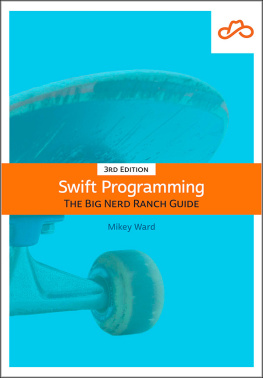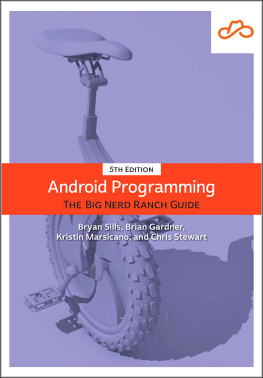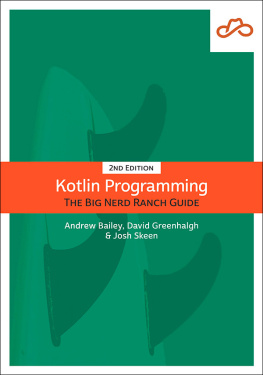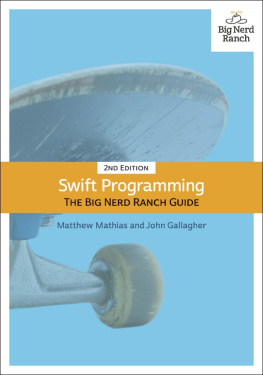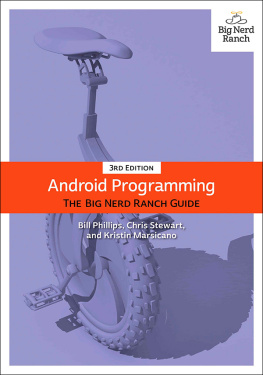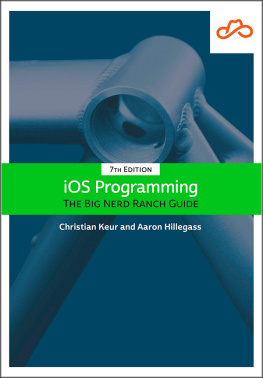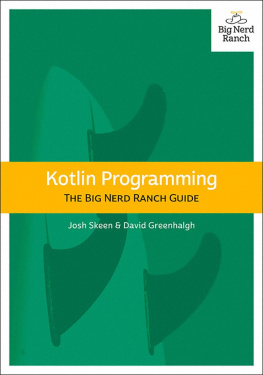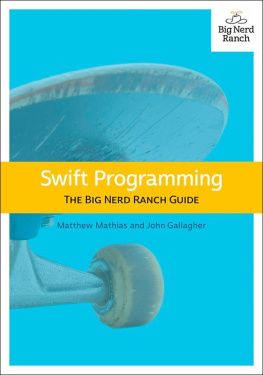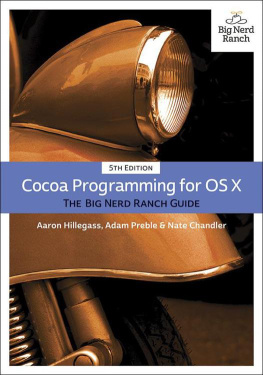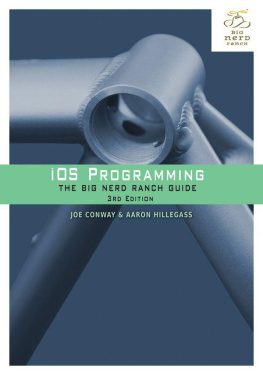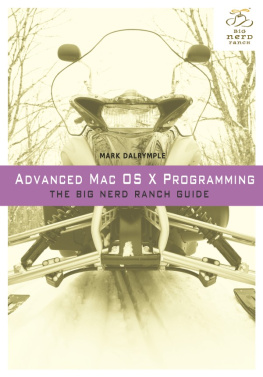Mikey Ward - Swift Programming: The Big Nerd Ranch Guide
Here you can read online Mikey Ward - Swift Programming: The Big Nerd Ranch Guide full text of the book (entire story) in english for free. Download pdf and epub, get meaning, cover and reviews about this ebook. year: 2020, publisher: Big Nerd Ranch Guides, genre: Computer. Description of the work, (preface) as well as reviews are available. Best literature library LitArk.com created for fans of good reading and offers a wide selection of genres:
Romance novel
Science fiction
Adventure
Detective
Science
History
Home and family
Prose
Art
Politics
Computer
Non-fiction
Religion
Business
Children
Humor
Choose a favorite category and find really read worthwhile books. Enjoy immersion in the world of imagination, feel the emotions of the characters or learn something new for yourself, make an fascinating discovery.
- Book:Swift Programming: The Big Nerd Ranch Guide
- Author:
- Publisher:Big Nerd Ranch Guides
- Genre:
- Year:2020
- Rating:3 / 5
- Favourites:Add to favourites
- Your mark:
- 60
- 1
- 2
- 3
- 4
- 5
Swift Programming: The Big Nerd Ranch Guide: summary, description and annotation
We offer to read an annotation, description, summary or preface (depends on what the author of the book "Swift Programming: The Big Nerd Ranch Guide" wrote himself). If you haven't found the necessary information about the book — write in the comments, we will try to find it.
Swift Programming: The Big Nerd Ranch Guide — read online for free the complete book (whole text) full work
Below is the text of the book, divided by pages. System saving the place of the last page read, allows you to conveniently read the book "Swift Programming: The Big Nerd Ranch Guide" online for free, without having to search again every time where you left off. Put a bookmark, and you can go to the page where you finished reading at any time.
Font size:
Interval:
Bookmark:
Copyright 2020 Big Nerd Ranch
All rights reserved. Printed in the United States of America. This publication is protected by copyright, and permission must be obtained from the publisher prior to any prohibited reproduction, storage in a retrieval system, or transmission in any form or by any means, electronic, mechanical, photocopying, recording, or likewise. For information regarding permissions, contact
Big Nerd Ranch
200 Arizona Ave NE, Suite 200
Atlanta, GA 30307
(770) 817-6373
https://www.bignerdranch.com/
book-comments@bignerdranch.com
The 10-gallon hat is a trademark of Big Nerd Ranch.
Exclusive worldwide distribution of the English edition of this book by
Pearson Technology Group
800 East 96th Street
Indianapolis, IN 46240 USA
https://www.informit.com/
The authors and publisher have taken care in writing and printing this book but make no expressed or implied warranty of any kind and assume no responsibility for errors or omissions. No liability is assumed for incidental or consequential damages in connection with or arising out of the use of the information or programs contained herein.
Many of the designations used by manufacturers and sellers to distinguish their products are claimed as trademarks. Where those designations appear in this book, and the publisher was aware of a trademark claim, the designations have been printed with initial capital letters or in all capitals.
Third edition, first printing, September 2020
Release E.3.1.1
For Matt Mathias and John Gallagher; I stand on their shoulders. For Aaron Hillegass, who took a chance on hiring me. And for my parents, for their eternal loving support. |
| M.W. |
Writing a book is a team effort, and thanks are due.
First and foremost, thanks to Matt Mathias and John Gallagher, who wrote the the first two editions of this book. Their vision and creativity are still evident in its pages. Thank you Matt and John for all of the heart and soul that you poured into it.
Thank you also to Jacob Bullock, Juan Pablo Claude, Chris Downie, Nicole Hinckley, Chris Morris, and Zachary Waldowski, who went above and beyond in their contributions to this edition. Their words and wisdom have markedly improved its quality.
Over time, many colleagues have contributed to the continuous evolution of this book and our Swift training materials. They have provided a wealth of thoughtful suggestions and feedback. Thank you, Pouria Almassi, Matt Bezark, Amit Bijlani, Nate Chandler, Step Christopher, Kynerd Coleman, Matthew Compton, Mark Dalrymple, Joseph Dixon, Robert Edwards, Sean Farrell, Drew Fitzpatrick, Brian Hardy, Florian Harr, Tom Harrington, Gabe Hoffman, David House, Jeremiah Jessel, Bolot Kerimbaev, Christian Keur, Jake Kirshner, Drew Kreuzman, JJ Manton, Bill Monk, Chris Morris, Adam Preble, Kevin Randrup, Scott Ritchie, Jeremy Sherman, Steve Sparks, Rod Strougo, TJ Usiyan, Thomas Ward, Michael Williams, and Mike Zornek.
Colleagues in operations, marketing, and sales have provided instrumental support. Classes would literally never be scheduled without their work. Thank you Holly Avila, CJ Best, Nick Gravino, Mathew Jackson, Shannon Kroll, Anja McKinley, Thomas Moore, Q. Elle Mosley, Rodrigo Velasco, Don Wedington, Eric Wilson, and Madison Witzler.
And, of course, thank you to the many talented honorary Big Nerds who worked on the book.
Liz Holaday, editor extraordinaire, worked tirelessly to help refine, transform, and crystallize these ideas into prose. Your voice is integral to the quality of our work.
Anna Bentley jumped in to copyedit, correcting errors and inconsistencies. Thank you for your eagle eye and for accommodating the schedule crunch as the book raced toward completion.
Ellie Volckhausen designed the the cover; thanks for that rad skateboard!
Chris Loper designed and produced the print book and the EPUB and Kindle versions. Your hard work in the unglamorous part of production is extremely appreciated.
Finally, from all of us at Big Nerd Ranch, thank you to our students. We learn with you and for you. Teaching is part of the greatest thing that we do, and it has been a pleasure working with you. We hope that the quality of this book matches your enthusiasm and determination.
Apple introduced the Swift language for the development of iOS and macOS applications in 2014. It was a dramatic shift from Objective-C, the previous development language for Apples platforms. There is a lot to learn in a relatively new language, and this is especially true for Swift.
Swift continues to evolve even six years after its release. As new features are added, Swift users can collaboratively determine its best practices. You can be part of this conversation, and your work with this book will start you on your way to becoming a contributing member of the Swift community.
You may be wondering why Apple released a new language. After all, developers had been producing high-quality apps for OS X and iOS for years. Apple had a few things in mind.
First, the syntax of Objective-C dates back to 1984, before the rise in the 1990s of prominent scripting languages that popularized more streamlined and elegant syntax (like JavaScript, Python, PHP, Ruby, and others). As a result, Objective-C syntax is not as accessible or familiar to developers as more modern languages. Also, while the language pioneered many ideas in object-oriented programming and allowed a lot of flexibility for programs to change their behavior while running, a tradeoff was that fewer bugs were discoverable during development. Instead, bugs often revealed themselves as crashes once a program was in the hands of its users.
In addition to adopting more modern patterns and paradigms, Swift is designed to be more safe by strictly requiring that developers follow certain safety rules that, in Objective-C, are only suggestions. Objective-C did not aim to be unsafe, of course, but industry best practices have changed quite a bit since it was released. For example, the Swift compiler aims to minimize undefined behavior and save the developer time debugging code that failed at runtime.
Another goal of Swift is to be a suitable replacement for the C family of languages (C, C++, and Objective-C). That means Swift has to be fast. Indeed, Swifts performance is comparable to these languages in most cases.
Swift gives you safety and performance, all in a clean, modern syntax. The language is quite expressive; developers can write code that feels natural. This feature makes Swift a joy to write and easy to read, which makes it great for collaborating on larger projects.
Last, Apple wants Swift to be a general-purpose programming language. In December 2015, it open-sourced Swift and its compiler, inviting developer involvement to help the language progress and making it easier for developers to port the language to systems beyond macOS and iOS. Apple hopes that developers will use Swift to write apps for a variety of mobile and desktop platforms and to develop back-end web applications as well.
So do you still need to know Objective-C to develop for Apples platforms? The answer is a little. Being familiar with it can be helpful for the same reason that knowing some history is helpful: So you understand why things are the way they are and what decisions went into the modern way of doing things. But also, many Apple frameworks that you will use are written in Objective-C; even if you interact with them using Swift, the error messages that they produce will have an Objective-C accent, so debugging will be easier if you understand that language. And Apple has made it easy to mix and match Objective-C with Swift in the same project, so as you become a more advanced developer for Apples platforms, you might encounter Objective-C.
Font size:
Interval:
Bookmark:
Similar books «Swift Programming: The Big Nerd Ranch Guide»
Look at similar books to Swift Programming: The Big Nerd Ranch Guide. We have selected literature similar in name and meaning in the hope of providing readers with more options to find new, interesting, not yet read works.
Discussion, reviews of the book Swift Programming: The Big Nerd Ranch Guide and just readers' own opinions. Leave your comments, write what you think about the work, its meaning or the main characters. Specify what exactly you liked and what you didn't like, and why you think so.

